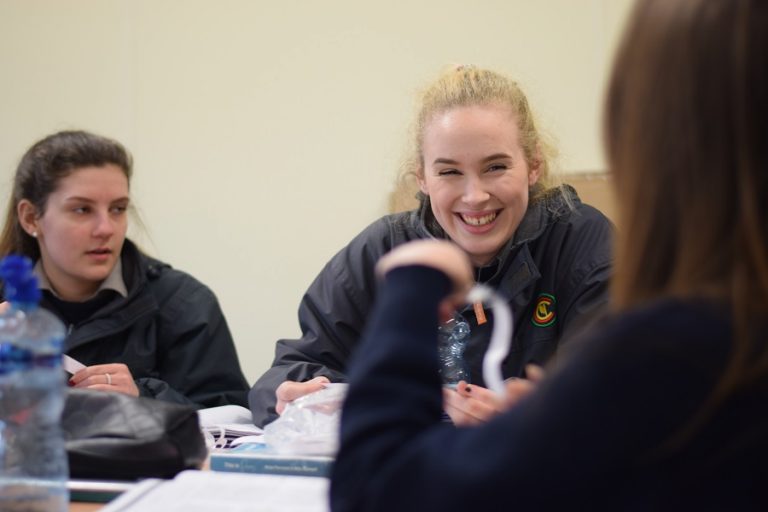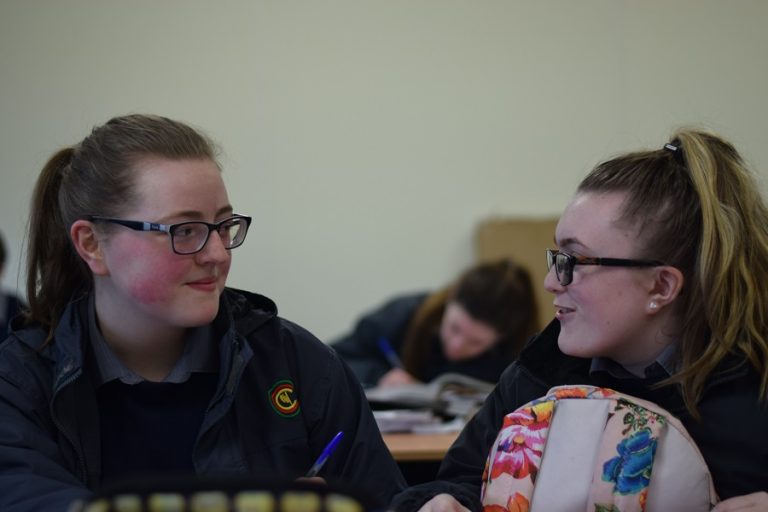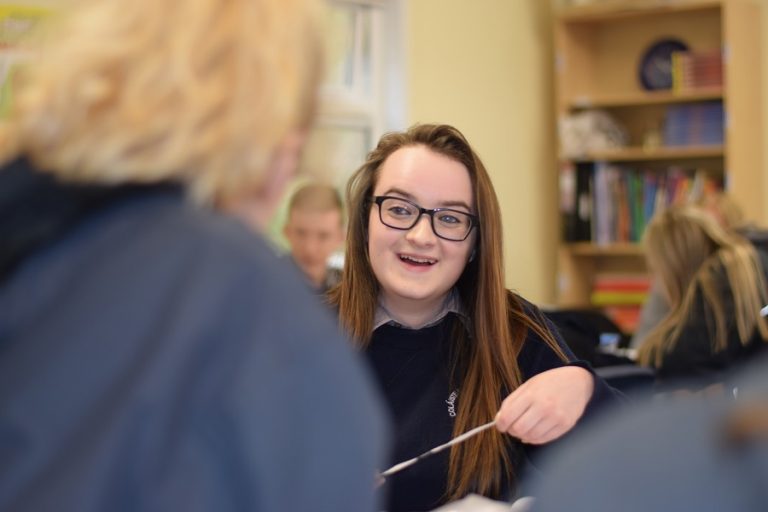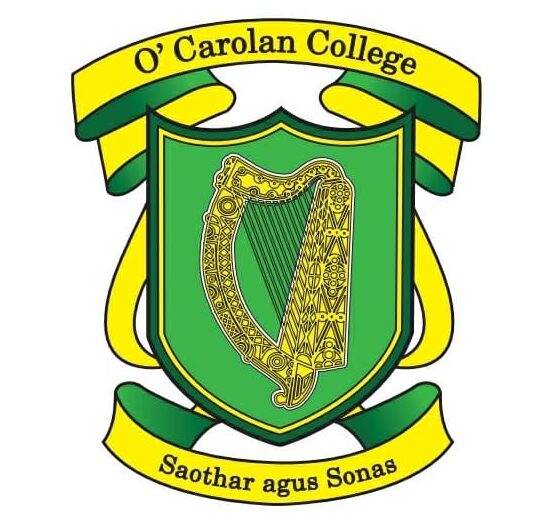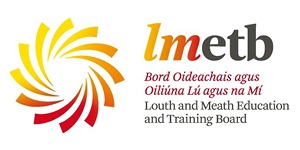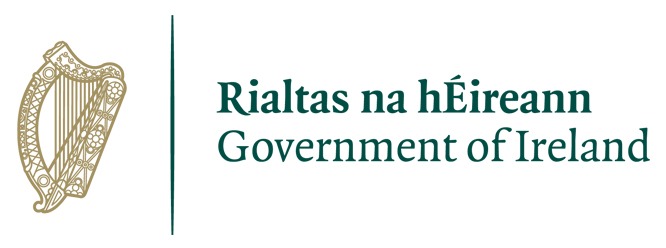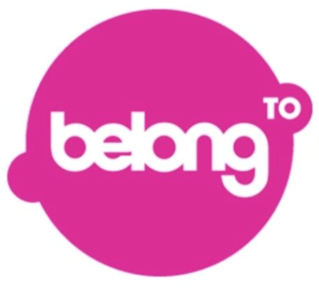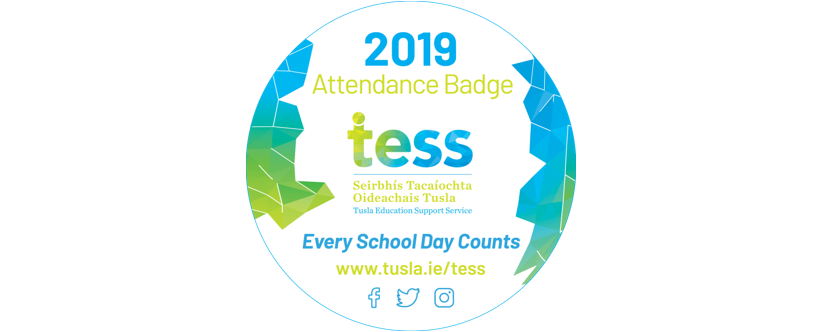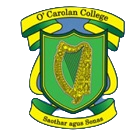Irish is a compulsory, core subject which is taken at both Junior and Senior levels. There are five class periods allocated to the teaching of the subject per week. In addition to this, a positive attitude to the language and its usage is actively encouraged in the daily school environment. All first, second and third year classes are mixed ability. Senior classes run concurrently to facilitate movement between levels. Club na Gaeilge takes place each week and offers students a chance to use their ‘cúpla focal’ outside of the classroom setting.
The Irish teachers met on a regular basis as a department in order to discuss subject development planning, the day to day running of the department, new curriculum content and methodology along with extra-curricular activities which promote the Irish language. They also engaged in collaborative process to ensure all expertise, resources and knowledge are shared. Furthermore, the Irish department also had allocated subject department meetings provided by the school management.
Junior and Leaving Certificate follow the syllabi as prescribed by the Department of Education and Skills. It is aimed at developing the four key language skills: listening, speaking, reading and writing. Particular emphasis is placed upon the spoken aspect of the language as marks allocated for this are worth 40% in the Leaving Certificate examination. We have introduced the new Junior Cycle specification for Irish with our first year group. They are following the new course, and will have two classroom based assessments (CBA’s) and one assessment task (AT) in second and third year.
In the first CBA, students create a Language portfolio with samples of their work. The language portfolio focuses on the language learning process and places the student and their learning journey at the centre of teaching, learning, and assessment. This gives students an opportunity to set personal learning goals, showcase their work, reflect on the work, and observe progress. The portfolio may include a range of student-created texts, e.g. projects, learning logs, creative pieces (poems/songs etc. created by the student) reflective pieces, recorded material (audio-visual and visual), texts, presentations completed etc.
Students may use literary texts from the literature list for second/third year as a stimulus for the topic/subject for this task.
On completion of the Classroom-Based Assessments, students will undertake an Assessment Task. This Assessment Task will be completed after the second Classroom-Based Assessment and is marked by the State Examinations Commission.
The Assessment Task will encompass some or all of the following elements:
As a department, we chose to undertake the optional oral exam at Junior Certificate level. This affords students the opportunity to gain confidence in preparation and experience for the Leaving Certificate oral which now follows a similar format. This opportunity is not given to students in all other schools. This optional oral examination comprises of 40% of the overall grade at Junior Certificate and it was felt by the department that it would greatly help students and provide an advantageous basis for their Leaving Certificate examination.
The Irish department adopted the new approach to language teaching as recommended internationally, ‘An Cur Chuige Teámach’. This involves contextualising the content taught by placing it within the daily sphere of the student. It is also the policy of the department to use authentic resources where possible.
The Irish teachers attended a number of in-service training sessions provided by the Professional Development Service for Teachers (PDST) on a variety of new methodologies and subject resources throughout the year. The annual Tionól Teagaisc took place in Sligo this year, and offered a range of informative workshops and valuable teaching resources. The Department attended in-service training days for the New Junior Certificate Irish where they learned more about the Key Skills and Class Based assessments.
Roinn na Gaeilge employ formative assessment throughout all year groups to allow for continuous evaluation of each student’s progress. At Senior Cycle, Fifth and Sixth year students sit monthly exams for all subjects. For Irish, this usually comprises of an exam style question or a mock oral exam, followed by constructive feedback on the student’s monthly report. All year groups have regular class assessments to monitor their progress, while exam years have ‘Bréagscrúduithe’ or Mock Exams in February (both oral and written).
An Triail – Turas na hArdteiste: In October, all Higher Level Sixth Year students went to see a live performance of the drama ‘An Triail’ le Máiréad Ní Ghráda in the AXIS Theatre in Ballymun. This live production gave students an insight into each character and helped them to visualize key moments of the drama.
An Idirbhliain: The Transition Years were involved in a variety of Irish projects with their teachers, mar shampla Film Studies. The students also enjoyed an Irish oral workshop with the comedy group ‘Caith Amach é’. The Transition Year students travelled to ‘Béal an Átha, Co. Mhaigh Eo’ to Coláiste Uisce for their Gaisce Adventure Trip. Some of the activities included surfing, paddle boarding and mountain climbing – trí mhéan na Gaeilge!
Club na Gaeilge is an integral part of student life at O’Carolan College. This year Club na Gaeilge took place every Tuesday i Seomra 49. During Club na Gaeilge, students enjoy a range of activities and games through the medium of Irish. Some of the activities included Biongó, Geandáil Ghasta (speed dating) and Damhsa Céilí. Club na Gaeilge gives students the chance to use the language in a natural, informal environment, and helped to foster a positive attitude towards Gaeilge
Seachtain na Gaeilge took place at the start of March and both staff and students made a huge effort to show their love for the language. A range of activities took place both in and out of the classroom setting including:
Scolaireachtaí Gaeltachta: The Irish department were once again delighted with the interest in Gaeltacht scholarships this year. Both Senior and Junior students will attend courses in Coláiste na bhFiann and Coláiste Chamuis in Summer 2020. We would like to express our gratitude to Louth Meath Education and Training Board (LMETB) and also Coláiste na BhFiann and Coláiste Chamuis for their contributions to our scholarship fund. Beatha teanga í a labhairt!
